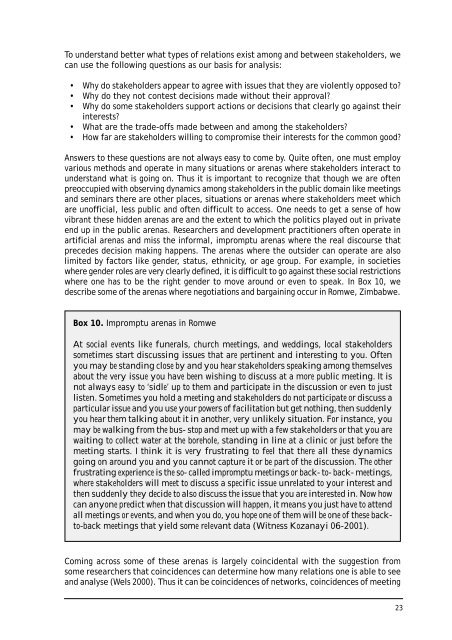Where the power lies: multiple stakeholder politics over natural ...
Where the power lies: multiple stakeholder politics over natural ...
Where the power lies: multiple stakeholder politics over natural ...
You also want an ePaper? Increase the reach of your titles
YUMPU automatically turns print PDFs into web optimized ePapers that Google loves.
To understand better what types of relations exist among and between <strong>stakeholder</strong>s, we<br />
can use <strong>the</strong> following questions as our basis for analysis:<br />
Why do <strong>stakeholder</strong>s appear to agree with issues that <strong>the</strong>y are violently opposed to?<br />
Why do <strong>the</strong>y not contest decisions made without <strong>the</strong>ir approval?<br />
Why do some <strong>stakeholder</strong>s support actions or decisions that clearly go against <strong>the</strong>ir<br />
interests?<br />
What are <strong>the</strong> trade-offs made between and among <strong>the</strong> <strong>stakeholder</strong>s?<br />
How far are <strong>stakeholder</strong>s willing to compromise <strong>the</strong>ir interests for <strong>the</strong> common good?<br />
Answers to <strong>the</strong>se questions are not always easy to come by. Quite often, one must employ<br />
various methods and operate in many situations or arenas where <strong>stakeholder</strong>s interact to<br />
understand what is going on. Thus it is important to recognize that though we are often<br />
preoccupied with observing dynamics among <strong>stakeholder</strong>s in <strong>the</strong> public domain like meetings<br />
and seminars <strong>the</strong>re are o<strong>the</strong>r places, situations or arenas where <strong>stakeholder</strong>s meet which<br />
are unofficial, less public and often difficult to access. One needs to get a sense of how<br />
vibrant <strong>the</strong>se hidden arenas are and <strong>the</strong> extent to which <strong>the</strong> <strong>politics</strong> played out in private<br />
end up in <strong>the</strong> public arenas. Researchers and development practitioners often operate in<br />
artificial arenas and miss <strong>the</strong> informal, impromptu arenas where <strong>the</strong> real discourse that<br />
precedes decision making happens. The arenas where <strong>the</strong> outsider can operate are also<br />
limited by factors like gender, status, ethnicity, or age group. For example, in societies<br />
where gender roles are very clearly defined, it is difficult to go against <strong>the</strong>se social restrictions<br />
where one has to be <strong>the</strong> right gender to move around or even to speak. In Box 10, we<br />
describe some of <strong>the</strong> arenas where negotiations and bargaining occur in Romwe, Zimbabwe.<br />
Box 10. Impromptu arenas in Romwe<br />
At social events like funerals, church meetings, and weddings, local <strong>stakeholder</strong>s<br />
sometimes start discussing issues that are pertinent and interesting to you. Often<br />
you may be standing close by and you hear <strong>stakeholder</strong>s speaking among <strong>the</strong>mselves<br />
about <strong>the</strong> very issue you have been wishing to discuss at a more public meeting. It is<br />
not always easy to ‘sidle’ up to <strong>the</strong>m and participate in <strong>the</strong> discussion or even to just<br />
listen. Sometimes you hold a meeting and <strong>stakeholder</strong>s do not participate or discuss a<br />
particular issue and you use your <strong>power</strong>s of facilitation but get nothing, <strong>the</strong>n suddenly<br />
you hear <strong>the</strong>m talking about it in ano<strong>the</strong>r, very unlikely situation. For instance, you<br />
may be walking from <strong>the</strong> bus- stop and meet up with a few <strong>stakeholder</strong>s or that you are<br />
waiting to collect water at <strong>the</strong> borehole, standing in line at a clinic or just before <strong>the</strong><br />
meeting starts. I think it is very frustrating to feel that <strong>the</strong>re all <strong>the</strong>se dynamics<br />
going on around you and you cannot capture it or be part of <strong>the</strong> discussion. The o<strong>the</strong>r<br />
frustrating experience is <strong>the</strong> so- called impromptu meetings or back- to- back- meetings,<br />
where <strong>stakeholder</strong>s will meet to discuss a specific issue unrelated to your interest and<br />
<strong>the</strong>n suddenly <strong>the</strong>y decide to also discuss <strong>the</strong> issue that you are interested in. Now how<br />
can anyone predict when that discussion will happen, it means you just have to attend<br />
all meetings or events, and when you do, you hope one of <strong>the</strong>m will be one of <strong>the</strong>se backto-back<br />
meetings that yield some relevant data (Witness Kozanayi 06-2001).<br />
Coming across some of <strong>the</strong>se arenas is largely coincidental with <strong>the</strong> suggestion from<br />
some researchers that coincidences can determine how many relations one is able to see<br />
and analyse (Wels 2000). Thus it can be coincidences of networks, coincidences of meeting<br />
23

















